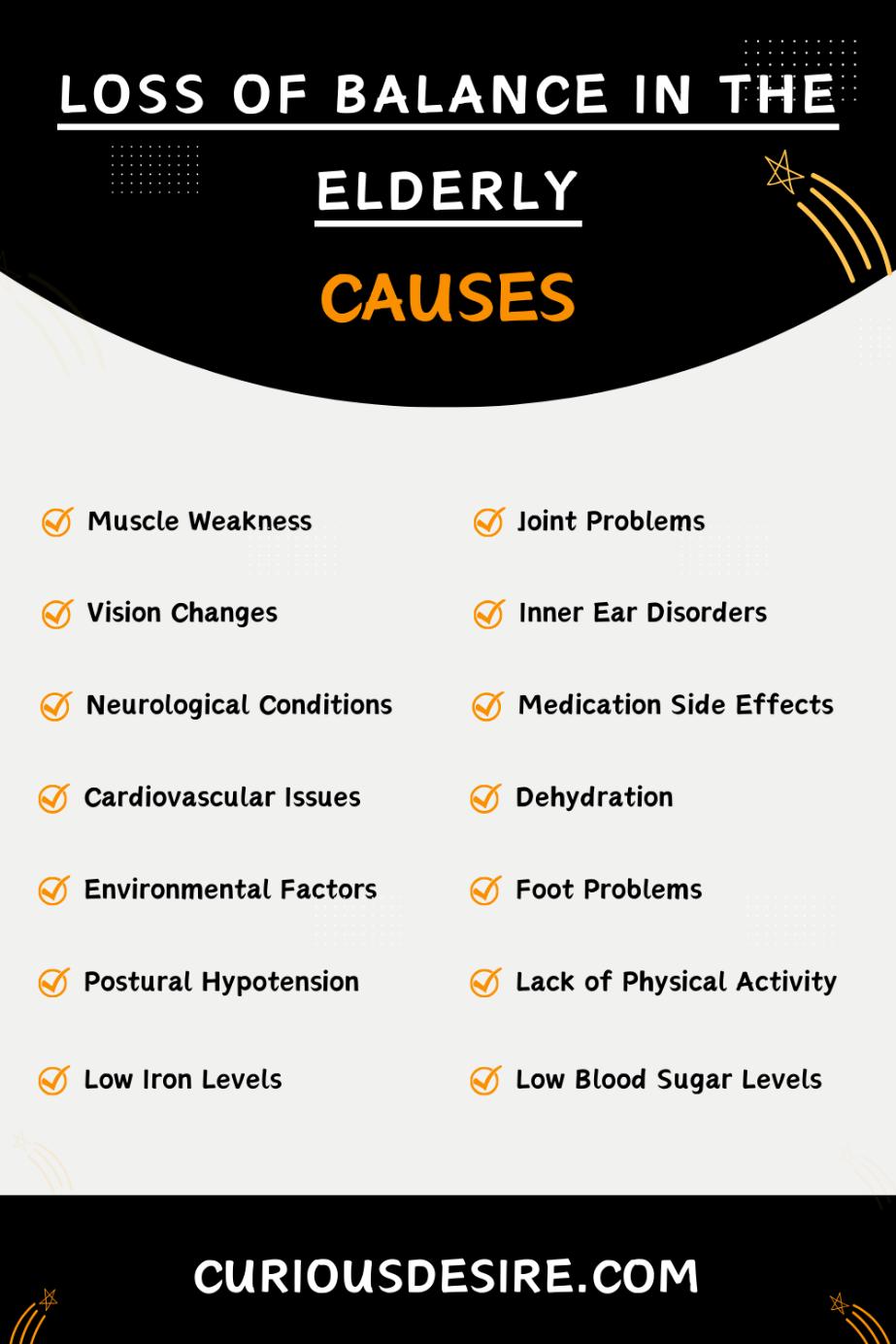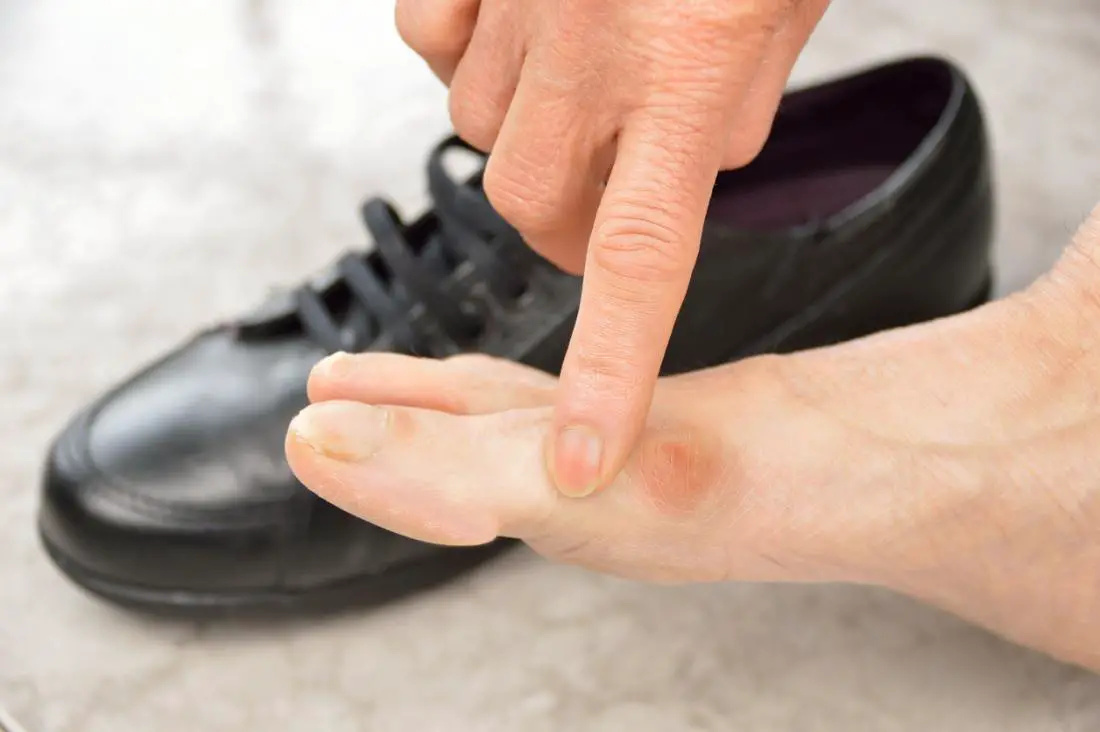Maintaining balance is important for daily activities, but as people age, various factors can lead to a decline in stability.
Understanding the causes of balance issues in the elderly is important for their safety.
From changes in muscles and joints to vision problems, this article aims to highlight key reasons behind balance issues in older adults.
Here are the top 5 causes of loss of balance in the elderly:
- Vision Changes
- Medication Side Effects
- Postural Hypotension
- Muscle Weakness
- Joint Problems
[toc]

Cause 1: Muscle Weakness
Muscle weakness is a common occurrence as individuals age. With advancing years, muscles generally experience a reduction in both size and strength, particularly in the legs.
Research indicates that the decline in muscle mass and strength often begins around the age of 30 and persists throughout life. This decrease can be attributed to a combination of factors, including physical inactivity and declining levels of growth hormone and testosterone.
These hormones play a crucial role in stimulating muscle development.
As their levels decrease, the muscles may not receive the same level of stimulation, contributing to the observed decline in muscle tissue and strength in older adults.
When this it becomes harder for older individuals to stand up straight, walk confidently, or keep their balance.
Cause 2: Joint Problems
Joint problems, like arthritis, are conditions where the joints in the body become painful and less flexible. For older individuals, this can mean that moving around becomes more difficult.
Imagine trying to walk or stand when your joints are stiff and sore. Arthritis can limit the ability to bend the knees or move the hips comfortably, making it tough to maintain balance while doing everyday activities.
Cause 3: Vision Changes
As we get older, our eyes go through some changes that affect how well we see things.
A study, held by NIH, explains that the shape and tone of a part in our eyes called the ciliary body, change with age. Along with that, there are changes in the flexibility of the lens capsule and how tightly packed the lens fibers are.
All these changes together make it harder for our eyes to adjust and focus on things at different distances.
These eye changes can make our vision a bit blurry or not as clear. It becomes difficult for older people to judge how far things are or notice obstacles in their way.
Because of this, there’s a higher chance of tripping over things and losing balance without expecting it.
Cause 4: Inner Ear Disorders
The inner ear is like the body’s balance control center. Disorders that affect the inner ear, such as vertigo or problems with the balance system, can make it feel like the world is spinning or tilting.
For older individuals, this sensation can be disorienting and lead to difficulty maintaining balance. It’s like trying to walk straight when the ground beneath you seems to be moving unexpectedly.
Cause 5: Neurological Conditions
The brain and nerves control how our muscles move and work together.
Conditions like Parkinson’s disease or peripheral neuropathy can disrupt these signals, making it challenging for the body to coordinate movements properly.
It’s like the communication system between the brain and muscles isn’t working as smoothly, causing difficulties in walking and balance.
Cause 6: Medication Side Effects
Sometimes, the medicines that older individuals take can have side effects. Some medications might make them feel dizzy or lightheaded.
It’s like the medicine is affecting their balance and making it harder for them to stay steady on their feet.
This can be especially concerning when trying to perform everyday activities like walking or getting up from a chair.
Cause 7: Cardiovascular Issues
The heart and blood vessels are like the body’s transportation system, delivering blood and oxygen to different parts, including the brain.
If there are problems with this system, like heart disease or issues with blood vessels, it can lead to dizziness or lightheadedness.
It’s like the body isn’t getting enough fuel to function properly, affecting balance and stability.
Cause 8: Dehydration
Dehydration, which happens when the body doesn’t have enough water, can have significant effects on older individuals.
When older individuals are dehydrated, they might feel weak and lightheaded, making it harder for them to stand or move around confidently.
Therefore, maintaining proper hydration is crucial for the elderly to ensure that their bodies have the necessary fuel to function optimally.
Cause 9: Environmental Factors
The surroundings where someone lives play an important role in their balance. Cluttered spaces, inadequate lighting, or objects in the way can increase the likelihood of losing balance.
Walking in such a place makes each step tricky and might lead to problems. To avoid falling, older people need to keep their living spaces clear and well-lit. This helps them move around more safely.
Cause 10: Foot Problems
Foot problems, such as arthritis or poorly fitting shoes, directly impact walking. When feet are painful or shoes lack proper support, it becomes challenging to walk comfortably.
Imagine attempting to move around when your feet hurt or your shoes don’t provide the necessary support – it disrupts the entire process of walking and balancing.
Addressing foot issues, choosing suitable footwear, and maintaining foot health are critical steps to ensure safer and more stable mobility for older individuals.
Cause 11: Postural Hypotension
Postural hypotension can be a concern for older individuals, especially when they stand up quickly. This sudden drop in blood pressure might make them feel dizzy.
It’s like their body struggles to adjust to the change in position, making it harder to stand and walk steadily.
This situation increases the risk of losing balance unexpectedly, highlighting the need for careful movements, especially after sitting or lying down.
Cause 12: Lack of Physical Activity
For older adults, staying in one place for too long without moving much can lead to weakened muscles and reduced coordination.
It’s like their muscles aren’t getting the exercise they need to stay strong and supportive.
Regular physical activity becomes crucial for them to maintain muscle strength, flexibility, and overall stability.
Engaging in activities like walking, gentle exercises, or even stretching can significantly improve their ability to move around confidently.
Cause 13: Low Iron Levels (Iron Deficiency Anemia)
Low iron levels, causing iron deficiency anemia, can affect older individuals more profoundly. This condition leads to feelings of fatigue, weakness, and dizziness, impacting their daily activities.
It’s as if their body is missing a vital component needed for optimal functioning.
Addressing iron deficiency through dietary changes or supplements is especially important for older individuals, as it directly influences their energy levels and overall stability, contributing to a more active and balanced lifestyle.
Cause 14: Low Blood Sugar Levels (Hypoglycemia)
For individuals with diabetes or those taking certain medications, hypoglycemia can be a concern.
It’s like their body is running low on the sugar it needs for energy, causing symptoms like dizziness and weakness.
These symptoms can affect their balance, making it harder to stand or walk steadily.
Managing blood sugar levels becomes crucial for maintaining overall stability.
Loss Of Balance In Elderly Causes FAQs
1. What is the main cause of balance problems?
The main causes of balance problems in the elderly are often related to age-related changes, including muscle weakness, joint issues, vision changes, and inner ear disorders.
Additionally, underlying health conditions such as neurological disorders, cardiovascular issues, and medication side effects can contribute to balance issues.
2. How do you treat balance problems in the elderly?
Treatment for balance problems in the elderly may include physical therapy to improve strength and coordination, exercises to enhance balance, and addressing underlying health issues.
Medication adjustments, lifestyle modifications, and creating a safe living environment are essential components of managing and preventing balance problems.
3. How do you treat balance disorder at home?
Home remedies for balance disorders include exercises to improve stability, maintaining good hydration, ensuring proper lighting and reducing clutter at home, and using assistive devices if necessary.
However, it’s crucial to consult with a healthcare professional for personalized advice and to rule out serious underlying causes.
4. Why do I feel off balance while walking?
Feeling off-balance while walking can be due to various factors, including muscle weakness, joint problems, inner ear issues, or neurological conditions.
Changes in vision, medication side effects, and environmental factors may also contribute to the sensation of imbalance while walking.
5. What deficiency causes you to feel off balance?
Deficiencies in essential nutrients, such as vitamin B12, can lead to feelings of imbalance.
Vitamin B12 is crucial for nerve function, and a deficiency can affect the nervous system, resulting in symptoms like imbalance and unsteadiness.
6. What organ affects balance?
The inner ear, specifically the vestibular system, plays a crucial role in maintaining balance.
This sensory system detects changes in head movement and helps the brain coordinate with the eyes and muscles to keep the body stable.
7. What medication helps balance problems?
Medications like vestibular suppressants or anti-dizziness drugs may be prescribed to alleviate symptoms of balance problems, especially in cases of inner ear disorders.
However, medication should be prescribed and monitored by a healthcare professional based on the specific diagnosis.
8. What medication can cause loss of balance?
Certain medications, such as sedatives, tranquilizers, or medications that affect blood pressure, can potentially cause loss of balance as a side effect.
It’s important to discuss medication side effects with a healthcare provider, who can adjust prescriptions as needed.
9. When should I be worried about my balance?
If you experience persistent or sudden onset balance problems, especially accompanied by other concerning symptoms such as dizziness, weakness, or confusion, it’s essential to seek medical attention promptly.
Additionally, if balance issues lead to frequent falls, medical evaluation is warranted.
10. Why do I feel off balance but not dizzy?
Feeling off-balance without dizziness may be related to musculoskeletal issues, neurological conditions, or problems with vision.
Inner ear disorders or certain medications can also contribute to a sensation of imbalance without the accompanying feeling of spinning or lightheadedness.
11. What causes dizziness and off-balance walking?
Dizziness and off-balance walking can result from various factors, including inner ear disorders, vestibular issues, medication side effects, or neurological conditions.
An evaluation by a healthcare professional is necessary to determine the specific cause and appropriate treatment.
12. Is it normal to feel a little off balance?
Feeling a little off-balance occasionally is normal, especially as we age or encounter temporary factors like fatigue.
However, persistent or worsening imbalances, especially when associated with other symptoms, should be evaluated by a healthcare professional to rule out underlying health issues.
13. What are the 10 signs of vertigo?
- Spinning sensation.
- Nausea.
- Sweating.
- Abnormal eye movements.
- Headache.
- I am ringing in the ears (tinnitus).
- Hearing loss.
- Unsteadiness.
- Blurred or double vision.
- Anxiety or panic.
These signs may indicate the presence of vertigo, a condition where a person feels a false sense of movement or spinning. If experiencing these symptoms, seeking medical advice is advisable.

